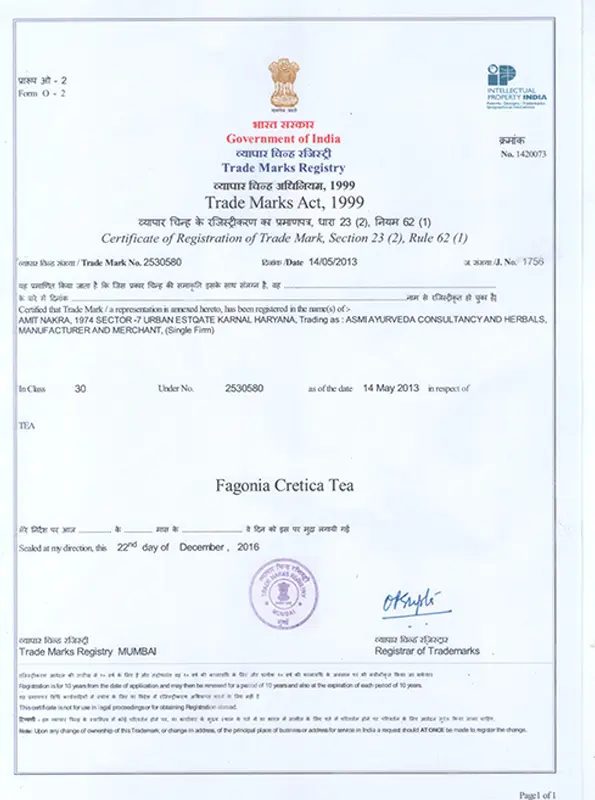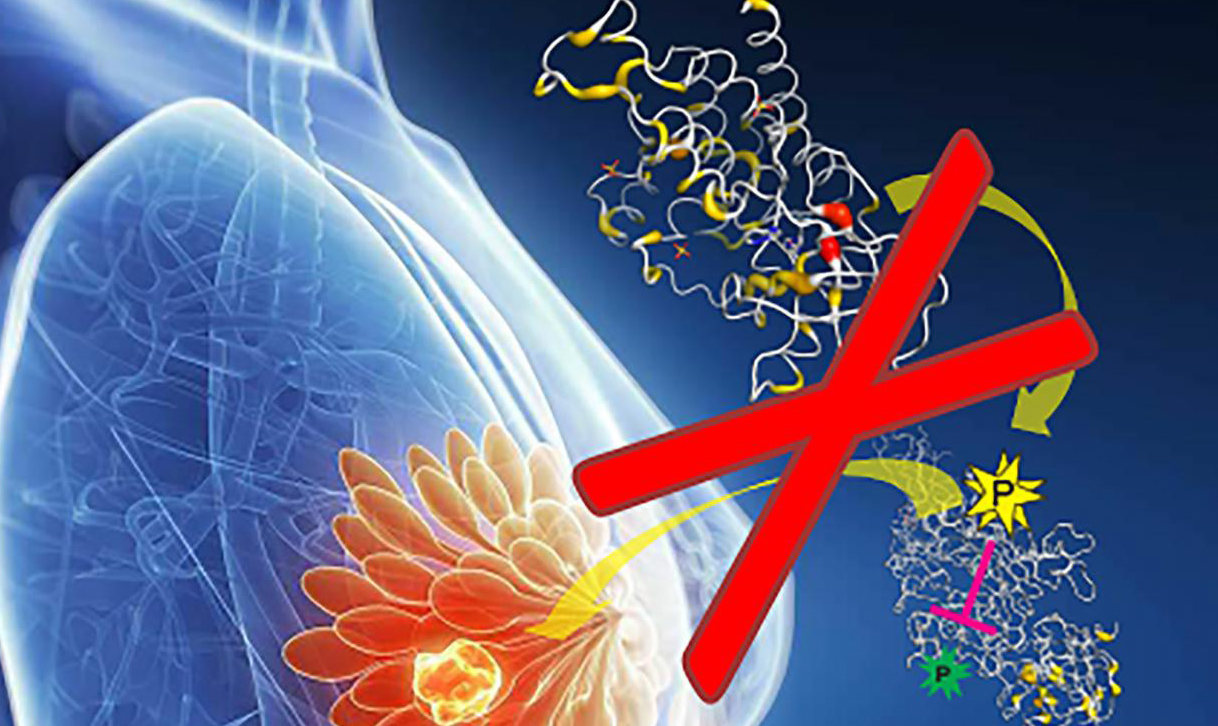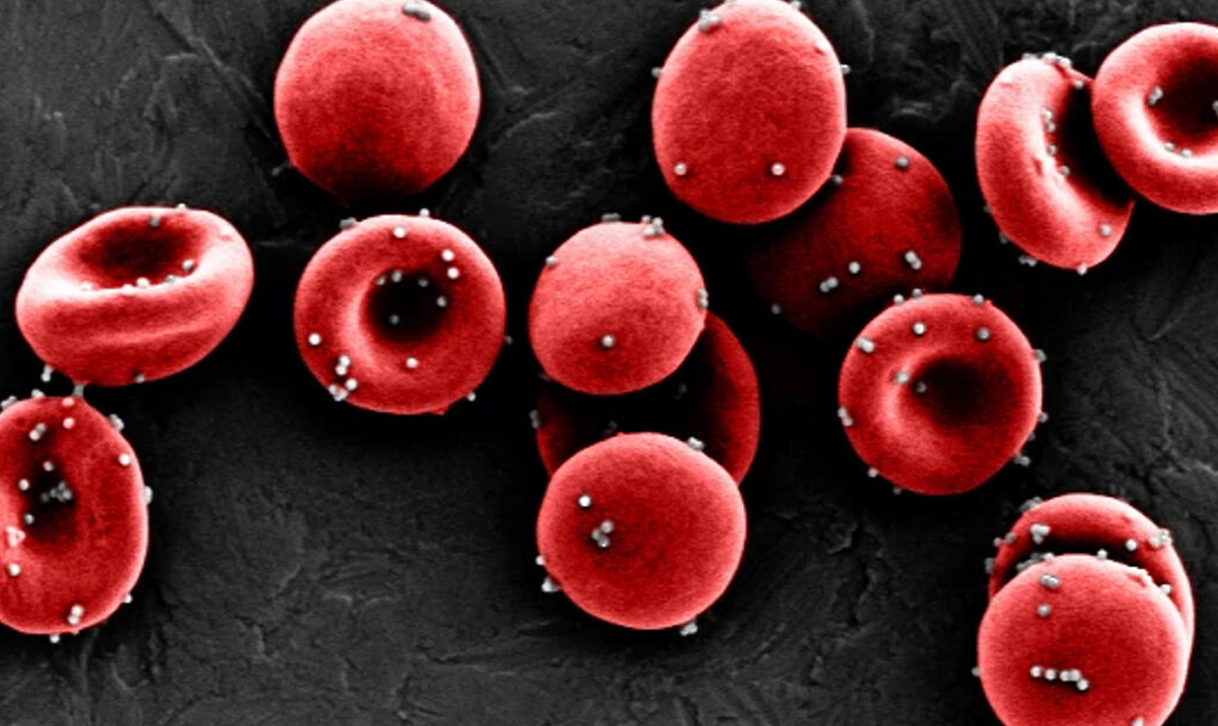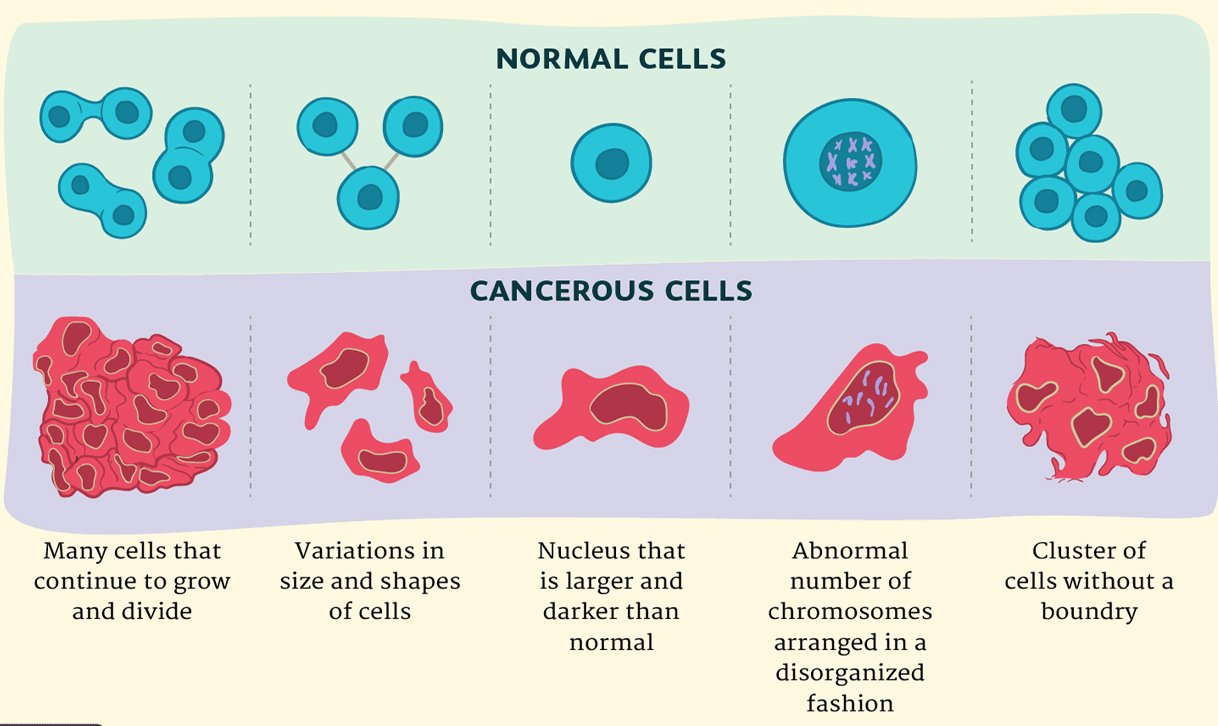Because Only Together We Can
Enabling cancer into remission by medicinal action of Fagonia cretica
Our innovation
Cancer in Remission with Medicinal Properties of Leaf and Flower – Dhanvyaas / Dhamasa / Durlabaha (Organic Fagonia cretica)
Please do share with regards age and illness details of patient in our email – AsmiConsultancyHerbals@gmail.com so we can confirm all details on medically recommended Dosage of Organic Fagonia cretica Tea for the patient.
Its to be noted, in an early stage of Cancer, the mixing ratio with regards Organic Fagonia cretica extract is Leaf 40 : Flower 60 while in Stage 4 (metastatic behavior), its Leaf 10 : Flower 90, and similarly as per illness severity / type of carcinoma, the mixing ratio of Leaf : Flower, daily dosage also varies on every individual patient basis.
We have Registered Trade Mark of “Fagonia cretica Tea” from Govt of India as per the attached certification here, so all cancer patients across the globe can be absolutely assured with regards the Authenticity of our Product and the medicinal potency as well of all other prescribed Herbal Formulations.

“Plants have proved to be an important and very accountable source of anti-cancer medications and that too without causing any adverse side-effects.
The cytotoxic anti-cancer action of fagonia cretica tea is very well researched by many medical universities across the globe and this authenticated product shall be received at your doorstep address anywhere in the world through DHL with free shipping available as well at many destinations.”
USES OF FAGONIA CRETICA EXTRACT FOR CANCER PATIENTS
Plants exhibit remarkable antioxidant behavior through a complex interplay of bioactive compounds, which play a crucial role in their defense mechanisms against oxidative stress. Oxidative stress arises when there is an imbalance between the production of reactive oxygen species (ROS) and the ability of cells to neutralize them. This imbalance can lead to cellular damage, aging, and various diseases, including cancer.
Fagonia cretica, commonly known as “Dhamasa” or “Virgin’s Mantle,” possesses a range of chemical constituents and medicinal properties that makes it very much beneficial in cancer patients.
The following points highlight some key compounds and properties that contribute to its immense therapeutic effects:
Polyphenolic Compounds:
- Fagonia cretica contains various polyphenols, including flavonoids, which exhibit potent antioxidant properties. Antioxidants help neutralize free radicals, reducing oxidative stress linked to cancer development.
Quercetin:
- Quercetin, a flavonoid present in Fagonia cretica, is known for its anti-inflammatory and antioxidant properties. It plays a role in inhibiting cancer cell growth and inducing apoptosis.
Kaempferol:
- Another flavonoid, kaempferol, found in Fagonia cretica, has been associated with anti-inflammatory, anti-proliferative, and apoptosis-inducing effects in cancer cells.
Tannins:
- Tannins present in the plant have been suggested to contribute to its medicinal properties. Tannins have antioxidant properties and plays a role in inhibiting the growth of cancer cells.
Beta-Carotene:
- Fagonia cretica contains beta-carotene, a precursor to vitamin A, which is known for its immune-enhancing properties. A strengthened immune system is crucial in cancer management.
Vitamins (C and E):
- The plant is a source of vitamins C and E, both of which have antioxidant properties. Vitamin C also plays a role in collagen synthesis and wound healing, important considerations in cancer patients undergoing treatments.
Alkaloids:
- Fagonia cretica contains alkaloids that contribute to its cytotoxic effects on cancer cells, potentially inhibiting their growth.
Saponins:
- Saponins found in the plant have been associated with various biological activities, including potential anticancer effects through mechanisms such as apoptosis induction and cell cycle arrest.
Terpenoids:
- Terpenoids, another class of compounds in Fagonia cretica, have exhibited anti-inflammatory and antioxidant properties. These contribute to cancer prevention and management.
Lignans:
- Studies suggest that Fagonia cretica contains lignans, which have been associated with anti-cancer effects by modulating various cellular pathways involved in tumor development.
Immunomodulatory Effects:
- Fagonia cretica has been proposed to have immunomodulatory effects, potentially enhancing the body’s immune response against cancer cells.
Anti-Inflammatory Properties:
- The plant has been traditionally used for its anti-inflammatory properties, which can be beneficial in managing inflammation-related aspects of cancer progression.
Anti-Microbial Compounds:
- Fagonia cretica has been reported to possess antimicrobial properties, which supports cancer patients by reducing the risk of infections during treatments that compromise the immune system.
Chemopreventive Potential:
- Chemical constituents in Fagonia cretica are known for their chemopreventive potential, offering promise in reducing the risk of cancer development or recurrence.
Traditional Use in Cancer Management:
- Fagonia cretica has a history of traditional use in various cultures for managing health conditions, including cancer.
In summary, plants like Fagonia cretica have evolved a sophisticated arsenal of antioxidants and bioactive compounds that collectively contribute to their exceptional ability to combat oxidative stress and potentially inhibit cancer development. The intricate synergy of these compounds highlights the importance of a diverse and plant-rich diet for maintaining optimal health and preventing chronic diseases, including cancer.
Testimonial of Cancer Patients after taking Fagonia cretica extract
SIGRUN from NORWAY
Here is a feedback of our 80 year old Breast Cancer Metastasis Patient from Norway. One and a half years ago, she was given only a few months to survive as her illness was highly aggressive and also she had not opted for any conventional protocols ever.
JOANNA from POLAND
The day, patient got diagnosed with stage 3 Prostate cancer, he started the intake of herbs within first week itself and after completing just 2 weeks of the intake process, he is comparatively looking very fine from within and is feeling overall good. His detailed
LYN from AUSTRALIA
Here is the feedback of our Stage 3 Breast Cancer patient from Australia and prior to taking the medicinal herbs – she was already diagnosed a Stage 3 with early metastasis to vital physiology. She then started the intake of all the herbs and with complete
ANTI-OXIDANT BEHAVIOR OF FAGONIA CRETICA EXTRACT IS LETHAL FOR CANCER CELL
The antioxidant behavior of Fagonia cretica plays a crucial role in providing potential benefits for cancer patients. Cancer development is often associated with oxidative stress, an imbalance between the production of reactive oxygen species (ROS) and the body’s ability to neutralize them. Antioxidants, abundant in various plant-based foods, help counteract oxidative stress and may contribute to cancer prevention, as well as supporting cancer patients undergoing treatments.
Here’s a detailed explanation of how the antioxidant behavior of Fagonia cretica is beneficial for cancer patients:
ROS Neutralization:
- Reactive oxygen species (ROS) are molecules containing oxygen with highly reactive and potentially harmful properties. Antioxidants in plants neutralize ROS, preventing them from causing damage to cellular structures and genetic material.
DNA Protection:
- Antioxidants help protect the DNA within cells from oxidative damage. Uncontrolled oxidative stress can lead to mutations in DNA, contributing to the initiation and progression of cancer. By preserving DNA integrity, antioxidants play a role in cancer prevention.
Cellular Damage Prevention:
- Oxidative stress can result in damage to lipids, proteins, and other cellular components. Antioxidants work to prevent such damage, maintaining the structural and functional integrity of cells.
Anti-Inflammatory Effects:
- Chronic inflammation is closely linked to cancer development. Many plant antioxidants possess anti-inflammatory properties, reducing inflammation and potentially hindering the progression of cancer.
Immune System Support:
- Antioxidants support the immune system, which plays a pivotal role in identifying and eliminating cancer cells. A robust immune response is crucial for the body’s natural defense mechanisms against cancer.
Apoptosis Induction:
- Some antioxidants found in Fagonia cretica are known to induce apoptosis, a process of programmed cell death. This mechanism is essential for removing damaged or potentially cancerous cells from the body.
Inhibition of Tumor Growth:
- Certain antioxidants, particularly polyphenols and flavonoids found in Fagonia cretica, have been associated with inhibiting the growth of tumors. They interfere with the signaling pathways that promote uncontrolled cell proliferation.
Enhanced Effectiveness of Cancer Therapies:
- Antioxidants found in Fagonia cretica enhance the effectiveness of conventional cancer therapies, such as chemotherapy and radiation. They can help protect normal cells from the side effects of these treatments while sensitizing cancer cells to the therapy itself.
Reduced Risk of Recurrence:
- A diet rich in antioxidants contributes to a lower risk of cancer recurrence. By maintaining a balance in oxidative stress levels, antioxidants support an environment less conducive to cancer development.
Support for Cancer Patients Undergoing Treatment:
- Cancer treatments like chemotherapy and radiation can generate oxidative stress. Antioxidant-rich foods can provide support by neutralizing the excess free radicals produced during these therapies, potentially reducing treatment-related side effects.
Cardiovascular Health:
- Antioxidants found in Fagonia cretica have positive effects on cardiovascular health. As cancer patients often face increased cardiovascular risks, the overall health benefits of antioxidants become particularly valuable during and after cancer treatment.
Enhanced Quality of Life:
- Antioxidant-rich diets have been associated with an improved quality of life for cancer patients. These diets may help manage symptoms, reduce fatigue, and support overall well-being during the challenging phases of cancer treatment.
Personalized Nutrition Plans:
- Tailoring antioxidant intake based on an individual’s specific cancer type and treatment plan allows for personalized nutrition strategies that can complement medical interventions.
Prevention of Metastasis:
- Antioxidants found in Fagonia cretica plays a role in preventing the spread of cancer cells (metastasis) by targeting pathways involved in invasion and migration.
Long-Term Health Benefits:
- Adopting a diet rich in antioxidants not only addresses the immediate challenges of cancer but also provides long-term health benefits, reducing the risk of developing other chronic diseases and promoting overall well-being.
While the role of antioxidants in cancer prevention and treatment is promising, it’s essential to emphasize that they should be integrated into a comprehensive cancer management plan and that individual responses may vary. Patients are advised to consult with our healthcare professionals by sending us an email or WhatsApp for personalized advice tailored to their specific health condition and treatment regimen.
Preventing cancer involves adopting a holistic approach that encompasses lifestyle choices, dietary habits, and regular health screenings. While it’s crucial to note that no single remedy guarantees cancer prevention, a combination of evidence-based strategies can significantly reduce the risk.
Here are 20 very useful preventative measures against cancer, along with their relevance and details:
Regular Physical Activity:
- Relevance: Exercise helps maintain a healthy weight, regulates hormones, and boosts the immune system.
- Details: Aim for at least 150 minutes of moderate-intensity exercise or 75 minutes of vigorous-intensity exercise per week.
Balanced Diet:
- Relevance: Nutrient-rich foods provide antioxidants, vitamins, and minerals crucial for cellular health.
- Details: Include a variety of fruits, vegetables, whole grains, and lean proteins in your diet.
Limit Processed and Red Meat:
- Relevance: Red and processed meats are associated with an increased risk of certain cancers.
- Details: Limit consumption of red meat and processed meats, opting for lean proteins like poultry, fish, or plant-based alternatives.
Regular Screenings:
- Relevance: Early detection through screenings can lead to more effective cancer treatment.
- Details: Follow recommended screening guidelines for breast, cervical, colorectal, and prostate cancers.
Sun Protection:
- Relevance: UV radiation is a known risk factor for skin cancer.
- Details: Use sunscreen, wear protective clothing, and avoid excessive sun exposure, especially during peak hours.
Moderate Alcohol Consumption:
- Relevance: Excessive alcohol intake is linked to an increased risk of various cancers.
- Details: Limit alcohol consumption to moderate levels or avoid it altogether.
Tobacco Avoidance:
- Relevance: Smoking and tobacco use are major contributors to lung and other cancers.
- Details: Quit smoking and avoid exposure to secondhand smoke.
Maintain a Healthy Weight:
- Relevance: Obesity is associated with an elevated risk of several cancers.
- Details: Adopt a balanced diet and engage in regular physical activity to achieve and maintain a healthy weight.
Vaccinations:
- Relevance: Certain viruses, like HPV and hepatitis B, are linked to cancer.
- Details: Stay up-to-date with vaccinations to prevent infections associated with an increased cancer risk.
Limit Sugar Intake:
- Relevance: High sugar intake is linked to inflammation and obesity, contributing to cancer risk.
- Details: Reduce consumption of sugary beverages and processed foods high in added sugars.
High-Fiber Diet:
- Relevance: Dietary fiber promotes digestive health and may reduce the risk of colorectal cancer.
- Details: Include whole grains, legumes, fruits, and vegetables in your diet for ample fiber intake.
Breastfeeding:
- Relevance: Breastfeeding is associated with a lower risk of breast and ovarian cancers.
- Details: Encourage and support breastfeeding for new mothers.
Limit Hormone Replacement Therapy (HRT):
- Relevance: Long-term HRT use may increase the risk of certain cancers.
- Details: Discuss the potential risks and benefits with your healthcare provider before starting HRT.
Adequate Hydration:
- Relevance: Proper hydration supports overall health and may reduce the risk of certain cancers.
- Details: Drink an adequate amount of water throughout the day.
Regular Dental Hygiene:
- Relevance: Poor oral health is associated with an increased risk of some cancers.
- Details: Maintain good oral hygiene practices, including regular dental check-ups.
Limit Environmental Exposures:
- Relevance: Minimize exposure to environmental toxins and pollutants.
- Details: Be aware of your surroundings and take precautions to limit exposure to harmful substances.
Mindful Use of Hormonal Contraceptives:
- Relevance: Some hormonal contraceptives may slightly increase the risk of certain cancers.
- Details: Discuss contraceptive options with your healthcare provider, considering individual risk factors.
Regular Eye Check-ups:
- Relevance: Eye health is important, and certain eye cancers can be detected early through regular check-ups.
- Details: Schedule routine eye examinations to monitor eye health.
Cancer-Protective Foods:
- Relevance: Certain foods, such as cruciferous vegetables and berries, are associated with potential cancer-protective effects.
- Details: Include a variety of cancer-protective foods in your diet.
Stress Management:
- Relevance: Chronic stress can impact overall health and immune function.
- Details: Incorporate stress-reducing practices like mindfulness, meditation, or yoga into your routine.
It’s important to note that individual cancer risk factors can vary, and preventive measures should be tailored based on personal health history, genetic predisposition, and lifestyle factors. Regular communication with healthcare providers and adherence to recommended screenings are essential components of a comprehensive cancer prevention strategy.

Feedback of patients after taking fagonia cretica
- Pain started reducing within first 48 hours of intake of the medicine
- Size of Tumour shrunk to 30 % to 40 % within first month of the Medicine
- There was a feeling of good energy level in the body ever since the Tea was started
- Anorexia / Nausea were down to a very minimal level
- Hair Fall in the cases of Chemo were reported very less
- Blood Cell count in the cases of Chemo were also good in number
- The Fagonia Tea plays a major role in preventing the re-occurrence of Cancer once the patient has been operated for mastectomy and undergone the sessions of chemo.
following medicinal herbal extracts are formulated & prescribed for cancer patients

Fagonia Cretica

Holy Basil (Ocimum sanctum Leaf Extract)

Wheatgrass (Leaf) and Tinospora cordifolia (Stem)

Curcumin

Lochenra Rosea (Leaf)

Podophyllum hexandrum (Fruit)
Latest health articles and news from Cancer Guide
Watershed Discovery – Break Cancer…
Researchers discovered that cancers wrap themselves in an invisible protective shield. and they learned that they could break into that […]
Squeezing Breasts may stop cancer…
A little squeeze may be all that it takes to prevent malignant breast cells triggering cancer, research has shown. A […]
Understanding Cancerous Cells – making…
The core premise of the leading model of cancer therapy is that cells become malignant when they develop mutations that […]
Aspirin drugs significantly reduces the…
Researchers have found that these drugs slow the accumulation of a type of DNA change called somatic genome abnormalities, that […]





